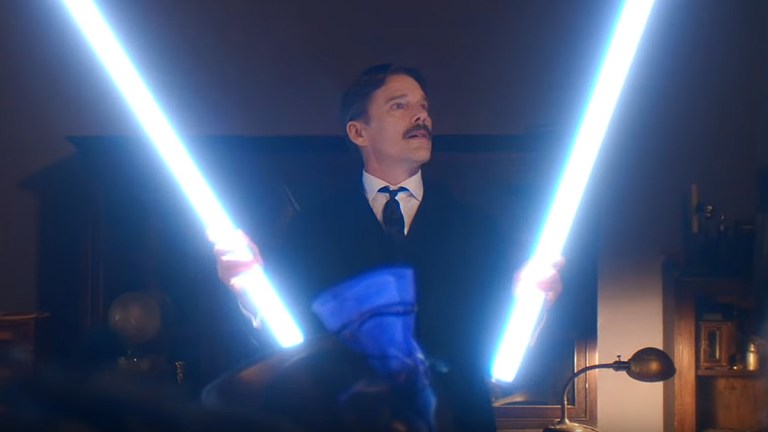Tesla Review: Ethan Hawke’s Spark of Madness
Ethan Hawke makes for an appropriately impenetrable mad genius as Nikola Tesla, even if the movie is also disappointingly remote.

Thomas Edison was often called the Wizard of Menlo Park. Which is to say that most Americans in the late 19th century viewed his patented incandescent lightbulb as a thing of magic, one so otherworldly it inspired the title of L. Frank Baum’s The Wizard of Oz. Yet much like the magician of that fantasy tale, the real-life wizard wasn’t the man behind the curtain; it was Nikola Tesla, the sphinxlike Serbian immigrant who discovered alternating electrical currents and, depending on who you ask, radio waves. If Edison was a wizard, then Tesla was something else entirely—an alien being sent down to imagine the face of the 20th century for us.
These singular contributions inform much of Michael Almereyda’s peculiar idea of a biographical film. Because, yes, despite its many eccentricities, Tesla is very much a biopic, and one just as bizarre as the genius of its title: a man who improved on Edison’s invention and then signed the legal rights of his alternating current generator away. The film chronicles this with its own idiosyncrasies, such as an intentionally artificial painted background here or a fourth-wall breaking aside there. At one point, his possible lover even pulls out a laptop to do a Google search on Tesla, all while discounting the popular photoshopped image of him walking through lightning—that’s a fiction for something out of Christopher Nolan’s The Prestige. The film you’re watching now, by contrast, wants to conjure an earthier, more esoteric magic.
It’s an evocative concept that makes for a postmodern collage about the man. Yet the spell it casts is fleeting and ultimately disappointing; Tesla is a movie that can be arresting in the moment, but remains as remote and elusive as its enigmatic subject matter.
Told with a free-wheeling narrative that jumps between the 1880s and ‘90s, the movie flips from the period where Tesla (Ethan Hawke) first fails to integrate in New York’s Edison Machine Works, owned by Thomas Edison (Kyle MacLachlan), to his dubious partnership with George Westinghouse (Jim Gaffigan). It also makes time for his doomed courtship of Anne Morgan (Eve Hewson), daughter of J.P. Morgan (Donnie Keshawarz), and even allows Anne to narrate the film as both a party clouded by Tesla’s genius, and as the omnipotent narrator who sees his self-destructive tendencies clearly.
But this emotional connection is less a through line than the easiest way to track the changes in Tesla’s life. Anne is there to see his rise as the immigrant wunderkind in New York society and then his slow and steady fall from notoriety, including when he becomes convinced that the radio technology he’s pioneering allows him to speak to Martians. Still, these elements amount to more a collection of anecdotes about Tesla’s life and times than a concrete narrative. With that said, they give Hawke a lot to play with.
Buried under a severe mustache, Hawke is effectively impenetrable as Nikola. Without paying a moment’s notice to the inventor’s famous accent, Hawke recedes so convincingly into Tesla that it’s as if he spends the whole movie staring out of a cavern, a bat in perpetual hibernation waking only long enough to judge us. It’s also complemented by MacLachlan’s understated but immensely enjoyable turn as Edison. Playing the temperamental capitalist as a confidence man who’s come to foolishly believe his own hustle, MacLachlan’s frequent showdowns with Hawke, including the first scene of the film, are when the movie sparks to life.
The pair have worked together before in an Almereyda film, the 2000 modernization of Shakespeare’s Hamlet. And like that film, Tesla wants to distill a well-known drama, in this case the American current wars, to their most symbolic essence. Also like that interpretation of Hamlet, the approach leaves something to be desired.
With a self-aware wink, Tesla revels in the imagery and myths that the electrical age ushered in. That goes from actual tall tales, such as Tesla allegedly throwing ice cream at Edison—a story Tesla both dramatizes and then immediately announces via voiceover as being a lie—to the invention of the Tesla coil looking like something out of James Whale’s Frankenstein movie: a picture that used literal Tesla coils as props. From matte backgrounds to sequences where Nikola’s ambitions can only be articulated by Hawke holding a yet-to-be-invented microphone and singing Tears for Fears, these elements are meant to add color and texture to a historic figure immortalized by black and white photography.
But they also turn capable performances and interesting scenes into underutilized tools that have been deployed across an electrical grid in a haphazard fashion. Rather than truly illuminate Tesla’s interior life or mind, these quirks obfuscate him behind a more artful type of special effect.
To be sure, the singular vision of Tesla is eye-catching, and in the end more luminous than a generic biopic like last year’s The Current War on roughly the same subject matter, but this fascinating story still feels underserved.Curiously, there was a third movie in recent development about these heady times, one based on Graham Moore’s terrific novel The Last Days of Night. I’m not sure if it’ll actually be filmed at this point after two movies on the subject in about as many years have seen the light of day, but like industrialists in the decades before the invention of the lightbulb, we know all the pieces are there to make something extraordinary. Hopefully, someone will finally be able to put them together in an electrifying manner one day.
